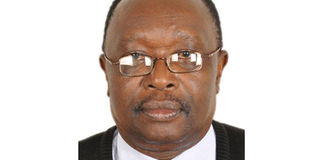Why I don’t agree that ‘the church in Africa is a mile wide and an inch deep’

Dr Olwa Ayo is a born again Christian and an orthopaedic surgeon in private practice.
What you need to know:
Big threat. The greatest threat to depth in Christianity as a relationship in Africa is not the fusion of Christianity with the worship of demon gods. It is the prosperity gospel.
No one seems to know the exact originator of the statement: “The church in Africa is a mile wide and an inch deep.” It is about the shallowness of the Christian faith in Africa. I, myself, have done some research, but returned empty handed. However, I found that many people who have written in approval of that statement base their lines of argument from an intellectual point of view.
The Church in Africa is populated by mostly illiterate parishioners with most of their immediate leaders possessing just a bare minimum qualification, either in basic education or theology. Intellectual Christianity will rightly say here that there is barely any depth of Christianity because the pastors do not know or cannot comprehend basic theological terms.
But that is not what defines relationship Christianity. It is the inward working of the Holy Spirit that is manifested in an outward lifestyle that defines depth in Christianity. “When they saw the courage of Peter and John and realised that they were unschooled, ordinary men, they were astonished and they took note that these men had been with Jesus”, Acts 4:13.
As a young doctor working in a missionary hospital, I met some missionary doctors from Europe who, upon completing their medical training, went to Bible colleges in preparation for missionary work among natives in Africa. They came armed with medical and biblical knowledge to start work. What immediately struck them upon arrival was the simple piety and devotion of the natives to the Lord Jesus Christ.
The natives didn’t know what hermeneutics (the study of the principles of interpretation concerning the books of the Bible) was, but the Spirit of God had taught them to understand scripture in its simplicity and live it out daily as changed people. Theology alone could not have dug for them any deeper roots in Christ than what the Spirit of God accomplished. The natives ended up ministering to the missionaries through their lifestyle and some of them ended up making a personal commitment to Jesus as Lord and Saviour. To be able to fathom the depth of Christianity in Africa, we need to differentiate Christianity as a religion from Christianity as a relationship with Jesus Christ. Religion is all about deeds. You work hard to attain favour with God. Relationship on the other hand, is about grace, God’s unmerited favour to sinful humanity through the sacrificial death of Jesus Christ.
The greatest threat to depth in Christianity as a relationship in Africa is not the fusion of Christianity with the worship of demon gods. It is the prosperity gospel that is being championed by flamboyant Western pastors and is being copied by African pastors. The loss of depth in Christianity in the West is being exported to Africa through the shallowness of the prosperity gospel. The Church has become so materialistic that the success of most ministries is being measured by the amount of money it collects from the congregation and the opulence of the physical structures that have been erected.
Christianity as a religion in Africa has its boundaries blurred with both African and Western rituals that are not in conformity with the truth of Scripture. Some of these ritualistic practices have been in existence since the dawn of Christianity in Africa. Several spiritual revivals in Africa over the last century have brought out Christianity in Africa as relationship with a living God through His son Jesus Christ. This is where I say there is not just width, but also depth in Christianity in Africa. The world is yet to see even greater revivals in Africa that will cement the African continent as the place where the glory of God dwells.
Dr Henry Olwa Ayo is a born again Christian and an orthopaedic surgeon in private practice


